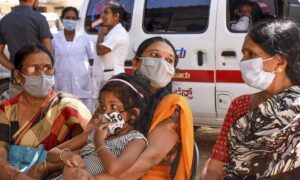London [UK]: The members of Stop Uyghur Genocide, a UK-based campaign to defend Uyghurs and other Turkic Muslims in China, staged a protest outside the Chinese Embassy to mark the 14th anniversary of Urumqi Massacre.
The protestors condemned China for its continued harassment and torture of Uyghur Muslims. “The tragic events that unfolded during the Urumqi Massacre 14 years ago were a turning point leading to the extensive victimisation of the Uyghur community and CCP’s implementation of its genocidal policies,” tweeted Stop Uyghur Genocide on July 5.
Rahima Mahmut, executive director of Stop Uyghur Genocide, said, “Today marks the 14th anniversary of the tragic events in Urumqi, where the Chinese government responded to peaceful protests with a heavy-handed crackdown involving the use of police, military forces, and live ammunition.”
In wake of these events, the Chinese government embarked on a campaign of terror characterised by extrajudicial arrests, enforced disappearances, public violence, and the establishment of a pervasive surveillance system compromising checkpoints and cameras.
The pivotal moment marked a significant turning point in the ongoing persecution of the Uyghur community.
“Today, we witness the devastating consequences of the indifference of the international community despite our pleas for help. It is crucial for governments across the globe to listen to our appeals and swiftly implement measures to protect the Uyghur population from the grave atrocities of genocide and humanity,” Mahmut added.
Muslims in the Bangladesh capital Dhaka also staged protests against the Chinese government’s oppression of Uyghurs.
As many as 350-400 Protestors carrying banners, placards and festooned with slogans in Bangla and English highlighting the plight of Uyghur Muslims, condemned China for imprisoning lakhs of Uyghur Muslims and urged the people of Bangladesh to condemn China for its inhuman activities.
“About 200 people died and 1,700 were injured in three days of violence between ethnic minority Uyghurs and Han Chinese that began on July 5, 2009, in Xinjiang’s largest city, Urumqi (in Chinese, Wulumuqi),” according to China’s official figures, reported Radio Free Asia.



















